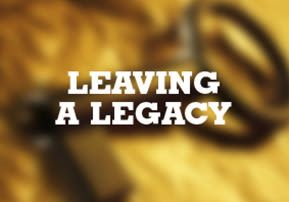
Leaving a Legacy
Is life about going through the motions? Having fun as young adults with no greater purpose, eventually “settling down” because it’s what’s expected of us - is that all?

Most people think that immortality is strictly related to the soul – it reincarnates over and over, and never dies. However, I view it as broader than that, and I’m sure many would agree. Immortality is also what a person leaves behind when he moves on to the World of Truth. It could be children, students, or anything that continues to exist and affect the world long after the person is gone.
Everywhere we turn we are bombarded by someone’s mark in the world. A certain shul is named after so-and-so. A bank carries the proud family name. A hospital bears the name of a generous philanthropist. And on and on…
It’s an interesting idea, this whole legacy business. It got me wondering- what compels people to want to leave their mark on the world after they’re gone? I mean, does it really matter to them when they’re dead whether or not they were an award-winning scientist who discovered antibiotics?
Of course it matters.
Long after we move on, our efforts stay right here, continuing to affect countless people. It’s like the stone that was thrown into the pond- long after it sinks, you can still see the waves rippling through larger and larger  segments of water.
segments of water.
This still didn’t answer my question, though. What is that driving force? Is it something we were born with, or is it something society pushes on us?
To me, it seems that we were given this inherent drive from G-d. Without it, what would be our motivation to do anything at all? Of course, some people are given more of this drive than others. You all know people like this. Maybe you are someone like this. These people are tremendous achievers, and accomplish so much in a condensed period of time. They are go-getters and always have that internal push to reach higher and higher in all of their accomplishments.
Of course, it doesn’t mean that all of these people have pure intentions, nor are they all necessarily good people. It’s just interesting to note that they were given a large measure of drive, and thus end up with something memorable about them (even if it’s not positive).
I once heard a great quote: The only hell is to know that you had an opportunity to accomplish something, and you didn’t take it.
This leads me to another thought – what do we live for? Is it even a thought in our heads? It may sound like a stupid question, but it’s really not. Is life about going through the motions? Having fun as young adults with no greater purpose, eventually “settling down” because it’s what’s expected of us, having a kid or two because we feel pressure from within or without, and working until we can no longer work? Then what? Watch CNN all day from the old folks’ home as we drool over our split pea soup?
What does such thinking leave us? That we must live for the day; that we must take advantage of each day and do the most we can with it. What do most people interpret this to mean? That you should live without fear of consequences, without thought to who you may hurt along the way, because you’re too busy “living for the day”.
Incidentally, that phrase has it right on. If you live for the day, do you have any other thought beyond what you will do with that day, aside from where your next vacation might be? Do we think about life goals that much?
And I’m not talking about career choices. I’m talking about goals that will help and affect mankind; goals that will leave their positive mark long after we’re gone.
Take Rav Arush, for example. He has dedicated his life to helping others realize that Hashem is in the world and running it exactly the way each person needs it to be. He’s losing precious sleep praying for people he doesn’t even know, just so they can have more emuna in Hashem’s ways. His books leave a lasting and life-changing impression on anyone who has read them.
Now I don’t expect everyone to go out and try to be on such a level. Hashem gave us each certain unique strengths and talents, and these are the tools we need to develop our potential. It is up to us to search for and discover what hidden or obvious abilities we were given, and decide how we will use them for the benefit of others.
It doesn’t have to be such a large-scale production. Helping others in your immediate circle or in your city is a huge accomplishment. For example, maybe you are a great listener; why not volunteer at the local home for the aged and give some people a chance to share their life stories with you? Or maybe you’re great with kids; you could help run an after-school program for the kids in your neighborhood.
Whatever your strengths are, it is up to you to use them. G-d already did the hard part and gave them to you; all you need to do is find them. Just to put it in perspective, imagine if Rav Arush had never written any of his books (G-d forbid!). Could you imagine what his trial might look like in the Heavenly Court? “Where are your life-changing books? Where are your millions of students?” What do you think his reaction would be?
Each of us was given a legacy to leave behind. What’s yours?











Tell us what you think!
Thank you for your comment!
It will be published after approval by the Editor.